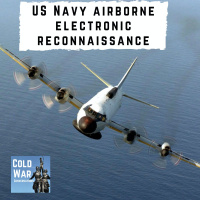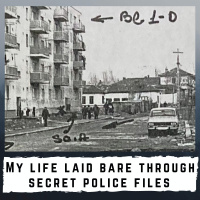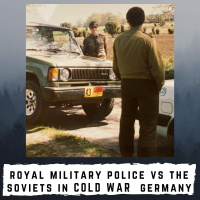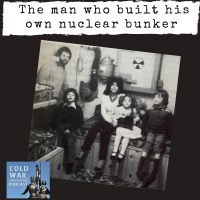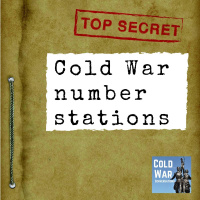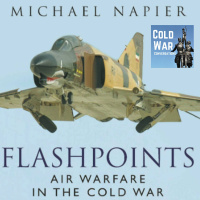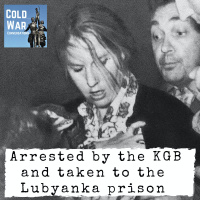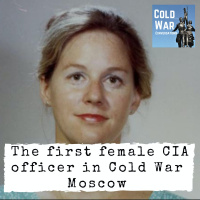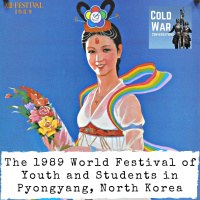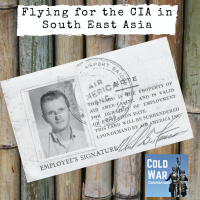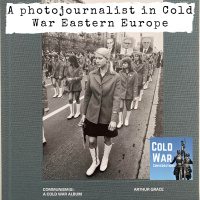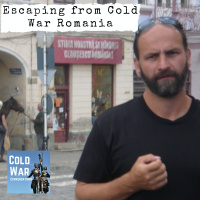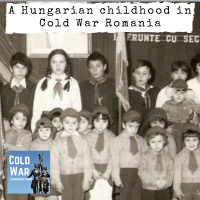Synopsis
In conversation with those that experienced the Cold War and those who are fascinated.
Episodes
-
A boy soldier in the Cold War Royal Engineers (245)
22/07/2022 Duration: 57minPaul joined the Royal Engineers in 1977, aged 16 as an apprentice. We hear of his experience of joining the army at such a young age and being away from home for the first time. After initial training his first posting was to Osnabruck in 1979. Shortly after his arrival Paul is appointed to the challenging role of driver to the Squadron Sergeant Major With participation in exercises such as Crusader 80 and Active Edge Paul describes in detail the role of Royal Engineers in Cold War Germany, including mine laying, bridge demolition and fixed defence construction. Paul’s story is full of great anecdotes and tales of the reality of life in the British Army of the Rhine. Don’t miss our next episode where Paul joins the Army Air Corps and becomes an Aircrewman Observer on Gazelle helicopters along the Inner German Border. 0:00 Introduction to Paul's journey in the Royal Engineers 1:30 Request for support to keep the podcast running 2:31 Paul's early life and decision to join the army 9:14 Paul's arrival in Osnabr
-
A Mormon missionary in Cold War East Germany (244)
14/07/2022 Duration: 01h24minIn the early 1980s East Germany had just 5000 members of the Church of Latter-day Saints, many of which had been members since before World War 2. In 1982 East German leader Erich Honecker historically allowed the church to build a temple in Freiberg and in 1988 Mormon missionaries were allowed into East Germany. Ken Brady describes his experiences as a Mormon missionary in East Germany as the country gradually disappeared and was absorbed into West Germany. Ken also gives us a valuable view of life away from Berlin in cities such as Cottbus, Gorlitz, Schwerin, Frankfurt an der Oder and Eisenhüttenstadt. It’s a fascinating story told with humour and candour as Ken grapples with local dialects, the local food and tricks with East German currency. 0:00 Introduction and Ken Brady's early interest in East Germany 7:16 The Church's operations in East Germany before the fall of the Berlin Wall 12:24 First impressions of East Germany 21:17 Fear of the Stasi after the fall of the Berlin Wall 28:18 Encounters with
-
US Navy Cold War airborne electronic reconnaissance (243)
08/07/2022 Duration: 01h17minKC flew the US Navy’s airborne Electronic Reconnaissance during the 1980s in the Lockheed EP-3 which is an electronic signals reconnaissance version of the P-3 Orion. He flew as a Navigator, Senior Electronic Warfare Evaluator and Mission Commander. We hear about several missions he was involved in including his first detachment to Athens the then main USN operating base for missions in the Mediterranean and the Adriatic. We also hear about flying in the Baltic from bases in the UK (Mildenhall/Wyton) or FRG (Schleswig-Jagel). Flying from Keflavik in Iceland KC monitored a huge Soviet Navy exercise in the Norwegian Sea involving the Kiev, Kirov, and numerous cruisers, destroyers, and frigates. In the 1980s Libya was claiming the Gulf of Sidra as its territorial waters and KC flew in support of “freedom of navigation” operations involving USN ships. It’s a great insight into a relatively unknown part of Cold War air operations. 0:00 Introduction and KC's experience on the EP3 9:21 Focus on the Adriatic and Yugo
-
My life laid bare through secret police files (242)
01/07/2022 Duration: 01h18minWhat is it like to be under secret police surveillance? On 10 March 1983, 12-year-old Carmen Bugan returned from school to find Romanian secret police in her living room. Her father’s protest against the regime had changed her life forever. In recent years Carmen gained access to the files of the Romanian secret police. She herself is surprised by the intimacy of the surveillance. Forgotten conversations, love letters, and arguments are all laid bare via the detailed notes taken by the Securitate. We hear the sadness of discovering friends and family members were involved in informing on them too. Carmen and I discuss the “language of oppression”, the subtle and not-so-subtle methods used to try and ensure a compliant population but still thwarted by humanity even in the darkest recesses of the Romanian prison system. It’s a warning from history and the meaning of freedom in current times. 0:00 Introduction of guest Carmen Bugan and her experience with the Romanian secret police 4:08 Carmen's first experi
-
Royal Military Police versus the Soviets (SOXMIS) in Cold War West Germany (241)
24/06/2022 Duration: 01h22minKeith Bailey Joined British Army at 16 in 1973. He was recruited into the Blues and Royals, (Household Cavalry) and served in West Germany as a gunner in Chieftain tanks. However, he was keen to serve in the Royal Military Police and particularly 19 (Support) Platoon known as "The White Mice". Their role was to track the SOXMIS (Soviet Military Mission) in West Germany. SOXMIS operated under a 1946 agreement where the Soviets, British, US and French agreed to exchange mission groups to patrol the opposing side’s then zones of occupation. The agreement continued to 1990 and needless to say both sides bent the rules somewhat… 0:00 Introduction 2:35 Keith Bailey's Military Career and Transition to the Royal Military Police 16:39 The Role of the RMP during the Cold War and Bailey's Experience 19:11 Joining the 19 Support Platoon and Training 23:29 The Presence of Soviet Troops in West Germany and Interactions 38:07 Soviet Intelligence Gathering and Anecdotes 43:28 Discussion about Soviet Precautions and Proto
-
The man who built his own nuclear bunker (240)
17/06/2022 Duration: 51minGraham Bate was 30-year-old Civil Servant when he built his own nuclear bunker in the garden of his rural home 20 miles outside Hull in the UK. It was here that the Bate family expected to survive for at least 3 weeks after a nuclear attack. We speak with Graham Bate and his son Conrad who was 5 years old when the bunker was built and has vivid memories of the period. 0:00 Introduction and background 0:53 Guest Introduction: Graham Bate and his nuclear bunker 2:26 The inception and design of Graham's bunker 7:04 Family's experience and trial run in the bunker 13:27 Reflections on the bunker project 20:10 The family's nuclear emergency plan 29:11 Security measures and local perspectives on the bunker 32:37 Living conditions in the bunker 37:03 Graham's fame and bunker building business 43:39 Impact of the Cold War on the bunker business 46:03 Learning curve and survival in a post-apocalyptic scenario Table of contents powered by PodcastAI✨ Cold War history is disappearing; however, a simple monthly donation wi
-
Cold War number stations (239)
10/06/2022 Duration: 01h19minYou might remember listening to short wave radio during the Cold War and coming across weird transmissions of metallic voices reciting random groups of numbers through the ether. These are number stations, shortwave radio stations characterised by broadcasts of formatted numbers, which were being sent to spies operating in foreign countries. Number stations were used widely during the Cold War and we speak with Jo Reggelt. Jo has been working with Simon Mason who was a founding member of ENIGMA, launched in the 80s after identifying several of these stations. We discuss in detail the operations behind the transmissions and the stations themselves. You will hear some sample transmissions which Jo has kindly allowed us to use, including one with drunken Stasi officers serenading their agents after the opening of the Berlin Wall. We also detail a UK spy case that centred on capturing an agent red-handed listening to a numbers station. There’s further information including links here. https://coldwarconversations
-
Air warfare in the Cold War (238)
03/06/2022 Duration: 54minThe Cold War years were a period of unprecedented peace in Europe, yet they also saw a number of localised but nonetheless very intense wars throughout the wider world in which air power played a vital role. I speak with former Cold War Tornado pilot and acclaimed aviation historian Michael Napier who has written Flashpoints: Air Warfare in the Cold War published by Osprey which describes eight of these Cold War conflicts. We discuss the wide range of aircraft types used and the development of tactics over a period of revolution in aviation technology and design which saw some of the most modern technology that the NATO and Warsaw Pact forces deployed. UK listeners buy the book here US listeners buy the book here 0:00 Introduction 2:08 Introduction of guest Michael Napier and discussion on the importance of personalizing conflicts 7:18 Deep dive into the Suez and Congo conflicts 14:54 Role of the UN's air force in conflicts and the impact of combat aircraft 24:08 Introduction to the Indo-Pakistan wars and
-
Arrested by the KGB and taken to the Lubyanka prison (237)
27/05/2022 Duration: 01h07minMarti Peterson was the first female CIA operative to be assigned to Moscow, probably the most challenging posting during the Cold War. Don't miss the previous episode here https://coldwarconversations.com/episode236/ This second episode turns to TRIGON, the code name for Alexandr Ogorodnik. He was an official in the Soviet Embassy in Bogota, Columbia recruited by the CIA in 1973. Marti and TRIGON never met in person, but they shared information through dead drops and intelligence. We hear about the tradecraft involved. Marti is arrested by KGB agents and taken to Moscow's Lubyanka Prison for questioning and talks in detail about that experience. UK listeners buy Marti's the book here and support the podcast US listeners buy Marti's the book here and support the podcast 0:00 Introduction and Marti Peterson's role in the Cold War 2:33 Recruitment of Trigon by the CIA 10:06 Marti's first dead drop for Trigon and surveillance evasion techniques 18:24 Marti Peterson's account of her adrenaline-filled Cold War o
-
The first female CIA officer in Cold War Moscow (236)
20/05/2022 Duration: 58minMarti Peterson was the first female CIA operative to be assigned to Moscow, probably the most challenging posting during the Cold War. Her story begins in Laos during the Vietnam War where she accompanied her husband John, a CIA officer. She describes their life in a small city in Laos, and the devastating news she received on October 19, 1972. Marti returned to the United States and one night at dinner a good friend suggested she look into working for the CIA. After making it clear to CIA recruiters that she didn’t want to be a secretary or an admin assistant they trained her to become an operative, effectively a spy. When Marti was posted to Moscow during the day, she worked as a diplomat at the U.S. Embassy. At night, on weekends and during her lunch breaks, she would report to the CIA station in the same building to do her work as an operative. UK listeners buy Marti's the book here and support the podcast US listeners buy Marti's the book here and support the podcast 0:00 Introduction and Marti Peters
-
The 1989 World Festival of Youth and Students in Pyongyang, North Korea (235)
13/05/2022 Duration: 58minThe 13th World Festival of Youth and Students was held from 1–8 July 1989 in Pyongyang, the capital of North Korea. It was the largest international event staged in North Korea up until then. The event took four years of preparation by the North Korean government, which effectively spent a quarter of the country's yearly budget (US$4.5 billion) on it. Ultimately declared as the largest ever World Festival of Youth and Student with about 22,000 people from 177 countries attending. This event was the last festival held during the Cold War era as waves of unrest began to occur throughout Central and Eastern Europe later on in the year. Greg Elmer has directed the film “The Canadian Delegation” which features long time activist Chris Frazer who was handed the task of assembling a Canadian delegation to North Korea. The film follows Frazer and a number of other delegates as they recount their participation in the Festival as world events continued to unfold around them. Cold War history is disappearing; however, a
-
Britain’s Cold War Human Chemical Warfare Experiments (234)
06/05/2022 Duration: 01h11minIan Foulkes was exposed to the deadly nerve agent Sarin in 1983 at the Porton Down Chemical & Biological Defence Establishment., one of the UK's most secretive and controversial military research facilities. Ian describes in detail the process and the ill effects this caused him and shares details of a little-known fatality where 20-year-old Ronald Maddison died 45 minutes after what scientists thought was 200mg of liquid Sarin dripped onto his arm. We also talk about the development of chemical weapons during the Cold War and the history of the Porton Down Chemical & Biological Defence Establishment. Up to 20,000 people took part in various trials at Porton Down from 1949 up to 1989. In 2004 Maddison’s death was ruled to have been Corporate Manslaughter. The MoD withdrew a challenge to this ruling minutes before the hearing. In 2008 the MoD paid 600 veterans of the tests £8k each without admitting liability. Now if you think there is a vast army of research assistants, audio engineers and producers putting
-
Flying for the CIA's Air America in South East Asia (233)
29/04/2022 Duration: 01h26minIn 1964, pilot Captain Hansen found himself unemployed. He began to send out feelers to several companies including one that had placed an ad in the Washington Post called Air America. When he was called in for an interview which primarily consisted of two questions - can you fly good and do you drink a lot. Air America was the airline owned by the CIA. Its operations were unknown. Its schedules were irregular. Its pilots were shadow people. Its world was the world of spooks, covert air ops, adventure, and danger. Hansen would be flying in Vietnam, Cambodia, Laos and other locations in Southeast Asia. It could not have been a better fit for Hansen, an addicted adrenaline junkie. He would end up staying in Asia for over a decade and was fortunate enough to live to tell us about it in his book “Flight” Buy Neil's book here Cold War history is disappearing; however a simple monthly donation will help preserve it and keep this podcast on the air. You’ll get a sought after CWC coaster as a thank you and you’ll ba
-
A photojournalist in Cold War Eastern Europe (232)
22/04/2022 Duration: 01h02minDuring the 1970s and 1980s, Arthur Grace travelled extensively behind the Iron Curtain, working primarily for news magazines. One of only a small corps of Western photographers with ongoing access, he was able to delve into the most ordinary corners of people's daily lives, while also covering significant events. His remarkable book Communism(s) A Cold War Album is effectively psychological portraits that leave the viewer with a sense of the gamut of emotions in that era. Illustrated with over 120 black-and-white images-nearly all previously unpublished- Communism(s) gives an unprecedented glimpse behind the veil of a not-so-distant time filled with harsh realities unseen by nearly all but those that lived through it. Shot in the USSR, Poland, Romania, Yugoslavia and the German Democratic Republic, here are portraits of factory workers, farmers, churchgoers, holidaymakers and loitering teens juxtaposed with Social Realist-designed apartment blocks, annual May Day Parades, Poland's Solidarity movement (and th
-
Escaping from Cold War Romania (231)
15/04/2022 Duration: 01h14minZsolt Akos Pall was 17 when he decided to flee Cold War Romania for a better life in the West. It’s a heart-warming story of the generosity of strangers. Young Zsolt finds compassionate border guards, gets lost in Vienna and has incredible luck wherever he turns as he negotiates the iron curtain as well as many other international borders to reach his brother in Sweden However, his escape is bittersweet as we hear of his emotional farewell to his parents, not knowing if he’d ever see them again. Cold War history is disappearing; however a simple monthly donation will keep this podcast on the air. You’ll get a sought after CWC coaster as a thank you and you’ll bask in the warm glow of knowing you are helping to preserve Cold War history. Just go to https://coldwarconversations.com/donate/ If a financial contribution is not your cup of tea, then you can still help us by leaving written reviews wherever you listen to us as well as sharing us on social media. It really helps us get new guests on the show. The
-
A Hungarian childhood in Cold War Romania (230)
08/04/2022 Duration: 49minZsolt Akos Pall was born in a small town in the Hungarian speaking part of Romania. For ordinary people, life in Romania in the 1980s was very hard and it could be even worse if you were a part of the Hungarian Szekler minority since the Communist government persecuted the Hungarian minority. They even made them change their Hungarian names into Romanian. Zsolt's brother was renamed Istvan to Stefan. However, Zsolt was baptised Zsolt, since there was no Romanian equivalent to it. Zsolt describes the shortages, his schooling and many other stories of life in Romania during this period. We end the episode with Zsolt’s plans to escape to Sweden. Don’t miss Part 2! Cold War history is disappearing; however, a simple monthly donation will keep this podcast on the air. You’ll get a sought after CWC coaster as a thank you and you’ll bask in the warm glow of knowing you are helping to preserve Cold War history. Just go to https://coldwarconversations.com/donate/ If a financial contribution is not your cup of tea, t
-
The shooting down of KAL007, the Able Archer exercise and the nuclear war scare of 1983 (229)
01/04/2022 Duration: 01h24minThe year 1983 was one of the most dangerous in human history. While the Cuban crisis was exceptionally dangerous and both the United States and the Soviet Union had significant nuclear arsenals in 1962, a war in 1983 would have likely ended the human race. Brian Morra was Chief of Intelligence Analysis for US Forces Japan at Yakota airbase when on 1st September 1983 an unarmed Korean airliner was shot down by a Soviet fighter causing the deaths of 269 people. He describes the less well known subsequent incidents between Soviet and US military aircraft which almost resulted in a shooting war between the two superpowers. During this period the Soviet leadership believed the US was going to launch a nuclear attack on their country. Their paranoia was heightened by several incidents during 1983 which are dramatized in Brian’s new novel “The Able Archers”, which is based on his experiences during that period. UK listeners buy the Able Archers book here US listeners buy the Able Archers book here Robert M. Gates
-
Charlotte Philby talks about her grandfather Soviet spy Kim Philby & her book "Edith & Kim" (228)
26/03/2022 Duration: 01h10minIn June 1934, Kim Philby met his Soviet handler, the spy Arnold Deutsch. Kim Philby was a British intelligence officer and a double agent for the Soviet Union. In 1963 he was revealed to be a member of the Cambridge Five, a spy ring that had divulged British secrets to the Soviets during World War II and in the early stages of the Cold War. The woman who introduced Philby to Deutsch was Edith Tudor-Hart and her story has never been told. Edith Tudor Hart changed the course of 20th-century history. Then she was written out of it. I speak with Charlotte Philby, granddaughter of Kim Philby. Charlotte has written "Edith and Kim" which draws on the Secret Intelligence Files on Edith Tudor Hart, along with the private archive letters of Kim Philby. This finely worked, evocative and beautifully tense novel tells, for the first time, the story of the woman behind the Third Man. We also hear from Charlotte what it was like having Kim Philby as her grandfather, including details of visits to see him in Moscow during th
-
The first woman to graduate from French Commando school (227)
19/03/2022 Duration: 01h18minMaura McCormick was posted to Berlin as a Signals Intelligence voice interceptor (Russian). Her workplace was the Teufelsberg U.S. listening station, aka Field Station Berlin. Maura shares her early impressions of Berlin and working at the Tberg. She talks about her impressions of the infamous James Hall, a United States Army warrant officer and signals intelligence analyst who sold eavesdropping and code secrets to East Germany and the Soviet Union from 1983 to 1988. Maura also recounts a close call with Hüseyin Yıldırım, a Turkish-American auto mechanic who was a Stasi courier for the espionage activities of James Hall. Maura often visited East Berlin where she tells of an unusually close encounter with a chimney sweep that almost resulted in an international incident. In West Berlin, Maura became the first woman to graduate from French Commando school. The commandant had a nightly call to Paris to confirm that she had survived the day's training… Now if you think there is a vast army of research assistants
-
Betrayed by comrades (226)
12/03/2022 Duration: 01h06minLiz Kohn has been researching Alice Glasnerová, who was imprisoned as part of the early Cold War Czechoslovak show trials known as the Slansky trials. These were among the most notorious show trials of the 20th century, with the prosecution and sentencing to death of Rudolf Slánský, general secretary of the Czechoslovak Communist party, and 10 other defendants, who had been arrested in a brutal purge ordered by Stalin. Alice Glasnerová was Liz’s father’s first wife. When Liz started researching Alice’s life she had never seen a picture of her and had never read a word she had written. All I knew was that she had been married to her father and had been a member of the communist party. Liz has pieced together a tragic story of a couple although deeply in love, who were separated by the difference in their political views which ultimately resulted in pain, disillusion and betrayal. Now if you think there is a vast army of research assistants, audio engineers and producers putting together this podcast you’d be



